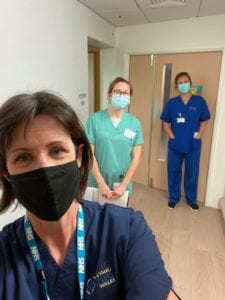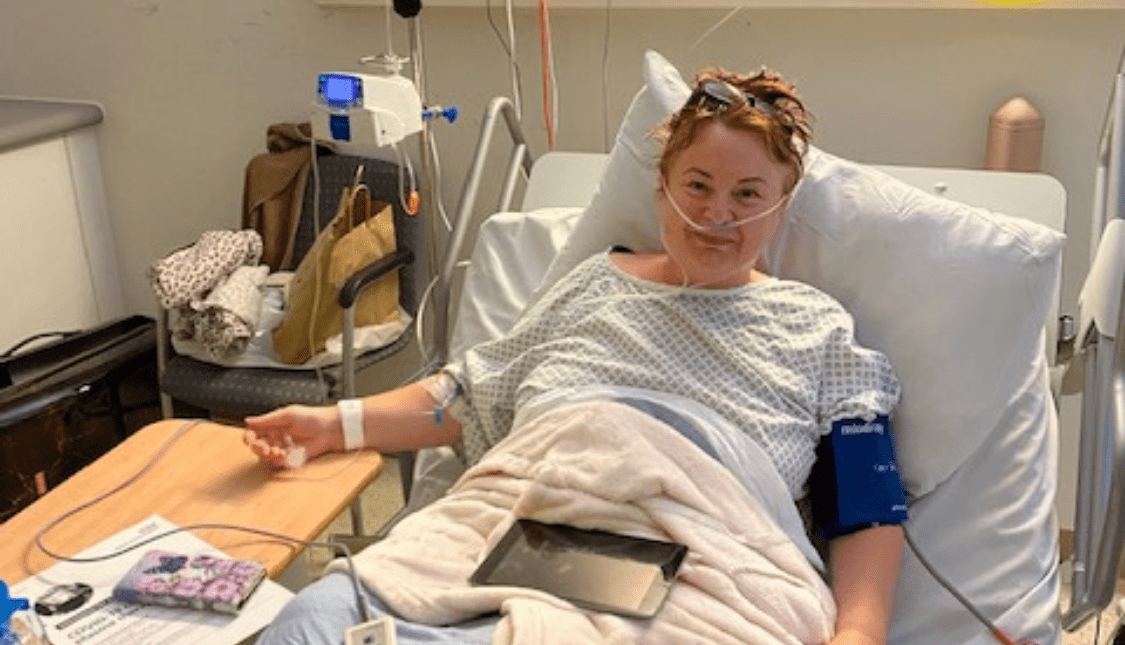A patient at University Hospital Llandough has become the first in Wales to receive a transfusion of monoclonal antibodies to treat COVID-19.
Melanie James, from the Pontprennau area of Cardiff, received the transfusion as part of the RECOVERY (Randomised Evaluation of COVid-19 thERapY) clinical trial, after being admitted to University Hospital Llandough with COVID-19.
The transfusion of monoclonal antibodies is the latest treatment to be added to the RECOVERY trial, which is the world’s largest randomised controlled clinical trial for COVID-19. The new arm of the trial aims to determine the effectiveness of monoclonal antibodies in preventing COVID-19 from entering the cells of patients infected with the virus, and preventing patients from becoming more severely unwell.
Melanie was breathless and receiving oxygen when she received the transfusion of the monoclonal antibodies, before her symptoms started to improve. Now recovering at home, Melanie said: “There was never any doubt in my mind about taking part in this research trial. I felt very poorly and had deteriorated very quickly, and I wanted to get better and to help other people to get better. We’re in the dark about COVID-19 and I wanted to give something back.
“I was very well informed about the trial before I consented to taking part. All of my questions were answered and the team put me at ease and gave me time to think. I felt that the team knew exactly what they were doing and saying, and I totally trusted them from the start of the process.
“I can’t speak highly enough of the treatment and care that I received from everybody involved, from clinical staff to the cleaners and those who offered me a drink. Everyone was so caring and kind so it made me feel really pleased to take part in the research.
“I started to feel better the day after the transfusion, and only had a small amount of oxygen during that night. Although I’m still recovering, I already feel much better than I did a week ago.”
Cardiff and Vale University Health Board has played a significant role in the RECOVERY trial, having been the first in the UK to open it in March. The Health Board has since recruited in excess of 210 patients to the trial, which in June found Dexamethasone to be the first drug shown to improve survival in COVID-19.
Now, the health board is once again at the forefront of RECOVERY trial having become the first organisations in Wales to recruit a patient to its latest arm.


Zoe Hilton, Research Team Lead, said: “We’re delighted to have recruited the first patient in Wales to this new arm of the RECOVERY trial. It is incredibly exciting to be working at the forefront of important work to identify potentially effective treatments for COVID-19, and I am hugely proud of research colleagues across Cardiff and Vale UHB for their tireless efforts in bringing this latest development to fruition.
“We are delighted that Melanie is feeling better, and wish her all the best with her ongoing recovery at home, however it is important to acknowledge that this arm of the trial remains in its very early stages and the widespread effectiveness of this treatment isn’t yet known.
“I’d like to extend the Health Board’s thanks to Melanie, and indeed all of our patients who have participated in clinical trials throughout the pandemic, for the vital contribution they have made to seeking effective treatments for COVID-19.”
Dr Stuart Walker, Executive Medical Director of Cardiff and Vale University Health Board, said: “Our research teams have made an outstanding contribution throughout the COVID-19 pandemic, and I would like to commend their efforts in implementing this trial so proactively.
“We are watching the ongoing global research into COVID-19 with great interest, in the hope that we are able to act upon further positive developments in the coming months.
“In the meantime, I would once again urge members of the public to play their part in controlling COVID-19 infection rates by following government guidance, and ensuring that they continue to wash their hands regularly for at least 20 seconds, wear a face mask in all indoor public spaces, and keep a two metre distance from others.”








Leave a Reply
View Comments